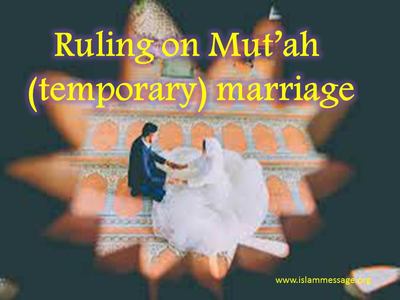
What is the ruling on mut’ah marriage?
Praise be to Allaah.
Mut’ah marriage means that a man marries a woman – either Muslim or
from the people of the Book – and specifies how long the marriage will
last, for example five days, or two months, or half a year, or many years.
The beginning and end of the marriage are specified, and he pays her a
small mahr (dowry), and after the specified time is over, the woman exits
the marriage.
This kind of marriage was permitted during the year of the Conquest of
Makkah for three days, then it was disallowed and prohibited until the
Day of Resurrection. This was reported by Muslim (1406).
The wife is the one with whom one stays on a long-term basis, as Allaah
says (interpretation of the meaning):
“… and live with them honorably …” [al-Nisaa’:19], but in the case of
mut’ah a man does not live with the woman for long.
The wife is the one who is called a wife in sharee’ah, with whom the relationship
is long-lasting. She is mentioned in the aayah (interpretation of
the meaning):
“Except from their wives or (the slaves) that their right hands possess,
for then, they are free from blame” [al-Mu’minoon : 6] – the latter (a
slave whom one’s right hand possesses) is not a wife according to sharee’ah,
because her stay is limited to a short time.
The wife is the one who inherits from the husband, or from whom the
husband inherits, because Allaah says (interpretation of the meaning):
“In that which your wives leave, your share is a half if they have no
child…” [al-Nisaa’ :12]. But the woman in a mut’ah marriage does not
inherit, because she is not a wife, since she spends such a short time with
the man.
On these grounds, Mut’ah marriage is considered to be zinaa (adultery or
fornication), even if both parties consent to it, and even if it lasts for a
long time, and even if the man pays the woman a mahr. There is nothing
that has been reported in sharee’ah that shows that it may be permitted,
apart from the brief period when it was allowed during the year of the
conquest of Makkah.
That was because at that time there were so many people who has newly
embraced Islam and there was the fear that they might become apostates,
because they had been used to committing zinaa during the Jaahiliyyah.
So this kind of marriage was permitted for them for three days,
then it was made haraam until the Day of Resurrection, as was narrated
by Muslim, 1406.
From al-Lu’lu’ al-Makeen min Fataawa Fadeelat al-Shaykh Abdullah ibn
Abd Al-Rahman ibn Jibreen, p. 41.


